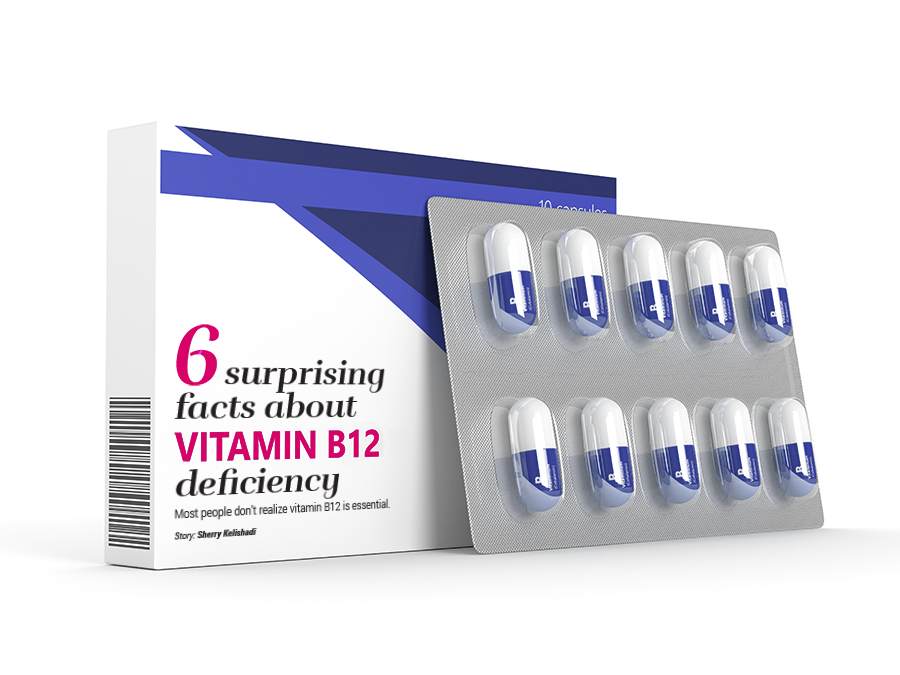6 Surprising facts about Vitamin B12 deficiency
Most people don’t realize vitamin B12 is essential
Story: Sherry Kelishadi
More than half of Americans take some form of dietary supplement for their overall health, according to a recent study published in the Journal of the American Medical Association. Taking multivitamins, fish oil, and other vitamin supplements is nothing new and something everyone should consider. But just as different car models require specific grades of fuel for maximum performance, individuals also need different levels of vitamins and nutrients to maximize their personal health.
However, too few recognize a key vitamin many are lacking: B12. Vitamin B12 deficiency has become a silent epidemic. Some of the most commonly mentioned side effects include fatigue, lack of energy, sluggishness, and dizziness. While there is a bucket full of other causes we might blame for such symptoms—such as lack of sleep, depression, or even more serious health risks, such as anemia—the scary truth is that a deficiency in vitamin B12 ultimately could be behind many, if not all, of these issues.
As an example, a person low on red blood cells may have pernicious anemia, a B12 deficiency anemia caused by an inability to absorb the vitamin B12 needed for their body to make those healthy red blood cells. Therefore, there may be more serious effects of vitamin B12 deficiency to look into than just the fatigue and sluggishness commonly associated with low B12 levels, for a lack of red blood cells itself could also cause those same effects.
As a vitamin B12 deficiency can manifest in a multitude of different ways, here are some important facts that may surprise you about the importance of vitamin B12 for your body:
1. There are not a lot of natural B12-rich food sources—Dairy products, eggs, meat, poultry, and fish provide the richest amounts of B12. Other foods, like some cereals, are enriched with B12. But overall, there are a limited variety of options for adequate B12 consumption, which leads us to the next important fact.
2. Vegetarians, and especially vegans, are at a higher risk for vitamin B12 deficiency—Those who have dietary limitations that include dairy, meat, and other animal-derived foods definitely should supplement their diets with B12.
3. With age, not only do we need more B12, but it also can become harder to absorb—Ironically, we need more B12 as we age. The average adult should get 2.4 micrograms a day. Unfortunately, while you may take supplements to ensure you are getting enough, the dose you take may not be the dose you are absorbing, especially if taken in pill form. Fortunately, sublingual vitamins such as Super B from NutraGlow provide supplementation with maximum absorbency. Sublingual vitamins are easier to take, taste better, and are more effective than those that come in pill form due to a superior absorption rate into the bloodstream.
4. Your body doesn’t store vitamin B12 for a long period of time—Even if you feel you eat plenty of foods rich in B12, that may not be enough. As we age, our body’s absorbency rates decrease, making it even more challenging to ensure we are getting enough B12 nutrients.
5. B12 helps make your DNA and RBCs—This circles back to what was mentioned above. We need our DNA and red blood cells even more than we need sleep and energy. B12 doesn’t just make us feel better, it also helps our body produce crucial elements of existence.
6. Heavy drinking and long-term use of acid-reducing medications also can inhibit absorbency of vitamin B12—Heavy alcohol consumption is not good for our bodies for a variety of reasons, the impact on vitamin B12 absorbency being one of them. Acid reflux and heartburn are common conditions also brought on by deeper-rooted factors that should be examined. Eliminating the need for medications for this issue would be a win-win situation.
Whether you don’t consume enough vitamin B12-rich foods, or your body does not absorb it well no matter how much you supplement, low vitamin B12 should be taken seriously. There are some fantastic options out there to improve B12 levels, products developed to help people maximize the benefits of vitamins B6 and B12. Look for vitamins that are preservative-free and promote improved overall health, energy, metabolism, and mental acuity.
Be proactive with your health by paying attention to any signs you may suffer from one of the lesser-known (or well-known) effects of vitamin B12 deficiency. Speak with your doctor about getting tested for B12 levels and make sure you are taking the most absorbable form of vitamin B12 out there.6
About the writer
Sherry Kelishadi is vice president and co-founder of NutraGlow Inc. She earned a doctor of pharmacy degree in 2011 from the University of Maryland School of Pharmacy. Her passion lies in nutrition, dermatology, bioidentical hormone replacement therapy, and wound care.

